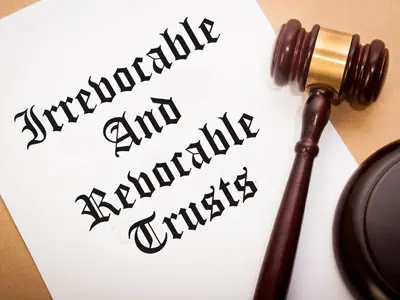Should Someone Have Both Irrevocable And Revocable Trusts?

Are Some Assets Better Suited For An Irrevocable Trust?
The answer to this question is yes some assets are better suited and other assets are not well suited for the irrevocable trust. Unfortunately, the asset that is better suited for my irrevocable trust may not at all be well suited for your irrevocable trust. The determination of which asset should go into which type of trust depends greatly on the reason that you are creating your irrevocable trust, what assets you own, what your predictable needs are to maintain your lifestyle and the family dynamics of your family. Therefore, plan to spend some time with your legal counsel determining what assets best suit your personal irrevocable trust given your personal circumstances.
Who Are Irrevocable Trusts Best Suited For?
Irrevocable trusts are best suited for people who have a strong desire to assure that their beneficiaries or heirs receive an inheritance or to assure that they maintain their independence and dignity as long as possible. To be honest, that probably covers almost all of us. We are reluctant to give up the right to share benefits with our children and grandchildren, or even to our churches and charities. Further, almost everyone wants to maintain their independence as long as possible. From my own experience, I have seen that many people living in nursing homes would not have had to be there had someone done an estate plan and then followed through to make sure that the plan was maintained for the benefit of the trust creator. What it means to you is that your chances of staying out of a nursing home and maintaining your independence can be greatly enhanced through the use of an asset protection plan. But it cannot be construed to mean that everyone must or even should create an irrevocable trust, nor does it mean that an irrevocable trust will create a satisfactory resolution for every situation. This calls for serious consideration and consultation with an estate planning professional who has knowledge and experience in helping people plan for their independence and for their gifts to their family.
How Do Irrevocable Trusts Help In Medicaid Planning?
A properly drafted, properly maintained and managed, irrevocable trust will not be considered an available resource for a Medicaid applicant. Therefore, when all of the Medicaid rules and law is followed, the trust creator can have provided for benefits to his or her heirs when otherwise those assets would be used to pay for his nursing home care before Medicaid could step in and help. Medicaid planning is best done well in advance. It is equally important to note that there are many things I can do for a prospective Medicaid applicant, even if they have failed to do long-term planning well in advance.
What Should A Person Consider When Naming A Trustee For Their Irrevocable Trust?
The first and most important issue that you must consider when choosing your trustee is that your trustee must be of impeccable character. Your trustee will have sufficient authority that they could, if they were so inclined, steal everything that you have put into your trust. Therefore, take great care to choose a trustee who either is known to have excellent character, or use a trust company that is insured. If an employee of a trust company steals trust funds, the insurance will assure that your family does not suffer financial losses.
Once you’ve chosen an excellent trustee, create a backup plan. What if that trustee does not then survive? What if she has suffered a terrible car accident or lawsuit? You will need someone else to step up and take care of this situation. Someone else will have to serve as the trustee. Once again, choose someone with excellent character or use a trust company that has the skill and insurance that will make the trust administration much more likely to succeed.
For more information on Irrevocable & Revocable Trusts, a free initial consultation is your next best step. Get the information and legal answers you are seeking by calling (405) 754-4166 today.

Call For Our Free Probate Book Or To Reserve
Your Seat At Our Free Estate Planning Workshop
(405) 754-4166